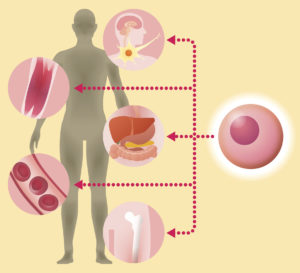06 Oct How Cytokines Fit Into Regenerative Medicine
Regenerative medicine is becoming largely integrated into a variety of different medical practices. It was originally made popular by the notoriety of stem cell therapy. When stem cells first came on the market, they demanded a lot of attention from medical professionals and patients alike. With so much focus on stem cells, there has not been as much attention focused on other forms of regenerative medicine. One of these regenerative medicine products from the San Francisco stem cell treatment center is cytokines. Cytokines have the ability to greatly contribute to a patient’s healing and are commanding more attention as more research is done on them.
What Are Cytokines
Before understanding how cytokines fit into regenerative medicine, it is important to understand what they are. Cytokines are small proteins, which are secreted by cells, and facilitate cell-to-cell communication. They are important in autocrine, paracrine, and endocrine signaling. When cytokines are released, they play an important role in immune responses and stimulating the movement of cells towards sites of inflammation, infection, and trauma.
Cytokines are important regulators of both the adaptive and innate immune systems. They play a role in inflammation and pain, which can have a significant overall effect on health and wellness. Both pro-inflammatory cytokines and anti-inflammatory cytokines exist. A proper balance of the two is needed to obtain optimal health.

Why Are Cytokines Beneficial In Regenerative Medicine
Cytokines are beneficial in regenerative medicine for a variety of reasons. While cytokines may not develop into other cell types as do stem cells, they are still very helpful in the body’s natural healing process. First and foremost, cytokines play a large role in inflammation-modulating. Pro-inflammatory cytokines are important when tissue is initially injured and stem cells are needed to help heal the area. Cytokines can “call” stem cells to the appropriate place. However, anti-inflammatory cytokines are important when the body is suffering from too much inflammation as is the case in certain forms of arthritis or inflammatory bowel disease. Anti-inflammatory cytokines can help to reduce inflammation, thus reducing pain for the patient.
In addition to modulating inflammation, cytokines also benefit those undergoing regenerative medicine because of their ability to facilitate cell to cell communication. The ability of cytokines to recruit other healing cells to an area of tissue damage is largely important for the overall healing process. Also, some cytokines can even help the body to repair damaged tissue.
Regenerative medicine is about more than just stem cells, according to Los Angeles stem cell therapy. As more research is conducted, it has become more apparent that cytokines play an important role in the body’s natural healing process. Visiting a regenerative medicine specialist who can combine the benefits of stem cell therapy along with the benefits of cytokines will give patients the best results. Once injected into the body, cytokines can better help to recruit stem cells to the appropriate location of damaged tissue. The ability to facilitate cell to cell communication is absolutely vital to the body’s healing process.


No Comments